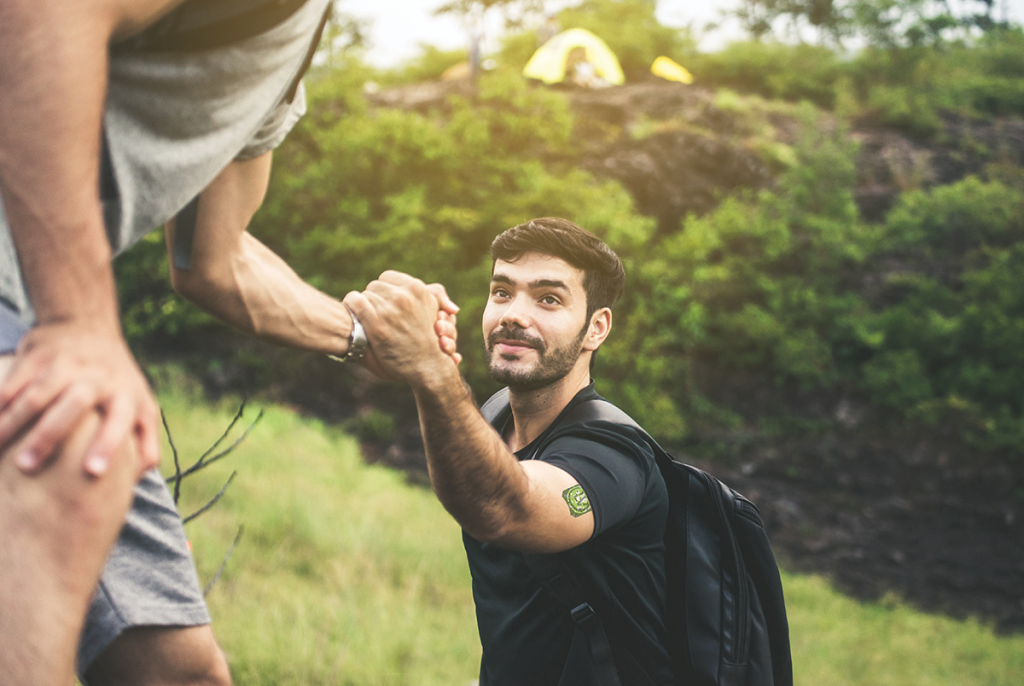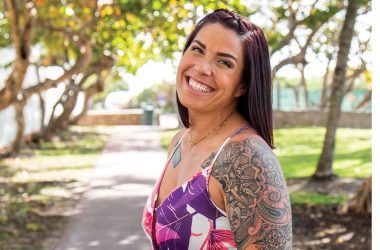Six secrets to building deeper, more meaningful connections with friends and business contacts
Humans crave connections. At the same time, many adults are lonelier than ever. “Coming out of the last two years of the pandemic, with lockdowns and everyone working from home, we’re all feeling the thirst to connect with people on a deeper level,” says Carolyn Sharp, a therapist with 25 years of experience helping individuals and families build healthy relationships.
“We’re all tired of relying on social media and Zoom calls to foster our relationships,” she says, “and we want to get out there and connect, or re-connect, in person and have meaningful conversations.”
But now, as people resume socializing and spend more time together in larger groups, Sharp says, many are realizing one thing: “We’re rusty at it.”
Even in the best of times, small talk, which does little to further a relationship, has been the norm in most social interactions. You’re at your child’s swim meet, or at a work function, and you find yourself mindlessly jabbering away with the people around you about the weather. When it’s time to go home, you realize you didn’t really get to know anybody you encountered on a deeper level.
If that sounds like you, you’re not alone. One recent study from a pair of researchers at the University of Arizona showed that only about a third of our social conversations involve an exchange of meaningful information. Even though people are craving deeper conversations with others, many lack the courage, knowledge or tools to initiate them, according to the report.
But there are some simple things you can do to begin attracting and nurturing deeper connections in your personal and professional life. Here are six steps to perfect:
A recent study of 300 online conversations by researchers at Harvard concluded that “How are you?” was one of the most meaningless questions people could ask in a conversation.
Make eye contact
All too often, Sharp says, she witnesses the same scene at her local coffee shop in Seattle. “People jokingly call it the Seattle freeze,” she says. “You see a big line of people waiting for their coffee, and people are so distracted by the stimulation on their phones that they completely fail to tune in to the human beings around them.
Simply making eye contact with someone is the first step to creating a bond with them, whether they’re a stranger or someone you already know,” she says.
Research has shown that eye contact activates the limbic mirror system. This means that the same exact neurons that are firing in someone’s brain will also fire in yours when you meet your eyes with theirs. “We’re all wired together through our eye contact,” Sharp says. So, if someone’s eyes are communicating joy, you’ll feel joy as well. The same goes for sadness.
This sharing of emotional states through eye contact can be the first step in helping you bond with others and get a better read on how someone around you is feeling without them even telling you.
Ask good questions
Whether you’re meeting someone for the first time or have known them for a while, many of us are naturally wired to ask the same questions over and over again and not pay close attention to the answers.
A recent study of 300 online conversations by researchers at Harvard concluded that “How are you?” was one of the most meaningless questions people could ask in a conversation, mainly because people typically respond with a stock answer (like “I’m fine”) that doesn’t further the conversation. The study found that those who were asked more meaningful questions found the other person more likable.
Bryan Daigle, a leadership coach who works with entrepreneurs to create a greater sense of connection and belonging in their lives, recommends avoiding questions that elicit “yes” or “no” responses, and instead ask people about something you think might be meaningful to them, such as their work, hobbies or family.
When Daigle runs workshops with corporate teams, he challenges participants to make a note on their name tag about something that is important to them. Inevitably, during coffee breaks, people begin asking each other about the topics on their name tags.
Daigle, for instance, recently wrote the word “France” on his name tag during a session. Later, when someone asked him about it, he talked excitedly about how he was planning a trip there with his toddler to visit places he hadn’t been since he was a teenager. “People could sense my excitement about the trip – and also maybe a bit of my fear that I was going to take such a long trip with a toddler,” he says.
To make new acquaintances feel valued, Paul Gravette, Co-Founder and Co-CEO of Le-Vel, emphasizes the importance of asking questions about how you might be of help. “Asking someone how you can help them, rather than talking about how they might help you, proves that you really care about them as a person,” he says.
Show appreciation
When you do get someone to open up, actively listen, and be sure to let them know you really heard them. Daigle often expresses his appreciation to someone when they open up to him and includes a compliment. For instance, if someone has told him about a personal challenge they’re going through, he might say something like, “I just want to let you know that I really admire what you’re doing. You’re going through a tough time and still showing up every day for work. That’s got to be very challenging.”
Daigle adds that, “showing empathy is a great framework for building a closer connection,” he says.
Be vulnerable
Another tip: Be willing to share your own experiences on a conversation topic. Daigle says he’s able to build stronger bonds with people when he simply speaks from the heart and shares his authentic self.
But don’t just spill your heart out to anyone. Sharp recommends looking out for cues to see if the person with whom you’re speaking is engaged in the conversation and comfortable with the subject matter.
If the person is distracted or looking around the room, he or she might not be as interested in the topic at hand. Other signs that people aren’t engaged is when they refuse to make eye contact with you or have a blank look on their face.
On the other hand, if their eyes light up when you speak to them, or they match your body language – like nodding when you’re telling them something positive – they’re likely enjoying the chat as much as you are.
If you don’t have someone’s full attention, “It’s perfectly okay to check in with them,” Sharp says. “It’s fair to say, ‘I don’t know you that well? Is this making sense?’ or ‘How do you feel about this?’”
Take the first step
If you’re looking to forge a connection with someone you’ve recently met, tell them so. Daigle suggests revealing your vulnerability by saying something like, “Hey, I enjoy spending time talking with you. I feel like we have some things in common and I’d love to get to know you better,” and see how they respond.
And don’t assume it’s a personal affront if someone doesn’t immediately respond to your invitation to grab coffee or attend a gathering at your home. “We’re all getting our sea legs back as social beings, and there’s going to be some clunkiness to our re-engagement,” Sharp says. “For some of us, getting back out in the world is like going from a silent chamber into a circus. It’s going to take us a little bit of time to re-engage.”
Be a Giver
If you approach a relationship with a “what’s in it for me?” attitude, you’re likely to fail to establish a solid bond. According to psychologist Adam Grant, who studies workplace behavior, people typically play one of three roles in relationships: givers (people who are always willing to help someone); takers (those who are only focused on what they might receive from the relationship); and matchers (those who try to keep an even balance of give and take).

Guess which type usually forms the strongest bonds? It’s the givers. “The more often you help others by sharing your knowledge, skills, talent or time, the closer people will feel to you,” he says. That doesn’t mean that you have to spend all your time nurturing a new relationship – a little bit can go a long way, he says. He recommends mastering the art of giving by doing “five-minute favors” – adding value to others’ lives by connecting people with one another, sending a new friend an article you think they might like, posting a positive note on someone’s social media feed, or even just saying “thank you” and really meaning it.
“If you can find even some small ways to add value to someone’s life, you’ll go a long way to strengthening your bond,” he says.
These tell-tale signs can reveal whether someone feels connected to you during a conversation:
The sign: Someone mirrors your body language while you’re talking to them. For instance, they cross or uncross their arms when you do or match your stance.
What it means: Mirroring is a rapport-building cue that signals the person’s desire to connect. People tend to mirror only those they like or want to get to know better.
The sign: A person makes little or no eye contact and blinks excessively.
What it means: The person isn’t interested in what you’re saying or is distracted. If their blink rate begins to slow, it could be a sign that they’re becoming more attentive.
The sign: A person raises his or her eyebrows slightly for a fraction of a second.
What it means: It’s a signal that they’re interested in what you have to say. It’s also used as a nonverbal “yes” during conversation.
The sign: Someone makes constant eye contact.
What it means: While frequent eye contact is a good thing, someone whose gaze is completely fixated on you is showing a territorial sign that displays aggression.
The sign: A person tilts their head.
What it means: When a person tilts their head to the side, exposing their neck, they’re revealing that they’re vulnerable and open to what you have to say.
Want to develop a stronger relationship with someone? Ask them these questions.
Most social situations call for small talk, not heart-to-heart conversations, which makes it difficult to connect with new people. One way to overcome these barriers is by revealing something personal about yourself to the other person and asking them to do the same.
This practice, called “reciprocal self-disclosure,” was studied by psychologist Arthur Aron and his colleagues at Stony Brook University. The researchers came up with a list of 36 conversation-opening questions that were proven to lead romantic partners to establish strong bonds with one another in a short period of time. Although originally established to foster intimacy in romantic situations, the questions have
since helped to break down emotional
barriers between thousands of strangers, resulting in friendships, in addition to
romantic partnerships.
Here are some of the questions to try out on someone with whom you’d like to develop a deeper bond:
- Is there something that you’ve dreamed of doing for a long time? Why haven’t you done it?
- Would you like to be famous? In what way?
- What would constitute a “perfect” day for you?
- For what in your life do you feel most grateful?
- If you could change anything about the way you were raised, what would it be?
- If you could wake up tomorrow having gained any one quality or ability, what would it be?What is the greatest accomplishment of your life?
- What is your most treasured memory?
- What do you value most in a friendship?
If someone’s eyes light up when you speak to them, or they match your body language, they’re likely enjoying the chat as much as you are.


